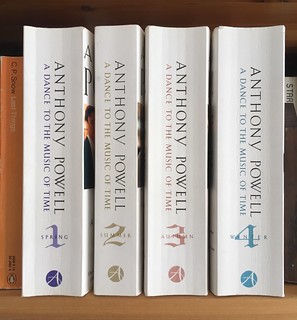If these end up being this regular, I’m not sure what to call each one.
I started the week with reading Interactive Data Visualization for the Web by Scott Murray which was as good an introduction to D3.js as I’ve read. I can’t tell if it’s much clearer than anything else I’ve tried or that, because I now know much more, it seems clearer. The beginning is certainly basic, but it does include a good, rapid introduction to HTML, CSS and JavaScript in case you’re a non-coding designer or journalist (or whatever) who wants to get to grips with D3. Good luck. Even after working with D3 for a few years (very off and on) I can’t imagine making anything using it that doesn’t involve adapting something previously written.
 Also this week I finished the last of the 12 books (or four bigger books) of Anthony Powell’s A Dance to the Music of Time. It feels good to have finished it, like a very long run through some fine but only occasionally interesting countryside. I felt the same about C.P. Snow’s eleven Strangers and Brothers books which I read before this. Perfectly OK, and not hard to read, but it sometimes felt like it was only the finishing line that kept me going.
Also this week I finished the last of the 12 books (or four bigger books) of Anthony Powell’s A Dance to the Music of Time. It feels good to have finished it, like a very long run through some fine but only occasionally interesting countryside. I felt the same about C.P. Snow’s eleven Strangers and Brothers books which I read before this. Perfectly OK, and not hard to read, but it sometimes felt like it was only the finishing line that kept me going.
I’m sure plenty was written about the similarities between the series when they were published. Both are first person accounts of a man’s life during the first three-quarters or so of the twentieth century. Snow’s narrator has more humble beginnings but both have comfortable lives in London, with (spoilers!) wives and children. Both make some of their living by writing books. Neither goes into much, if any, details about their children growing up, what their life as an author is like, or reflects on how they must appear to others. We get very little sense of what either is like as a person, other than as an inoffensive, capable, sociable-but-not-extrovert observer of the people and world around them. From these accounts both men are unemotional with often peculiar senses of what’s important (Powell’s has no sooner mentioned he’s taken a fancy to a woman than the next chapter begins some time after they got married).
The authors’ styles are different but I’m not very good at analysing literature so can’t identify what these difference are, other than the most obvious (e.g. Powell’s notoriously lengthy sentences). Perhaps a parody of each will illustrate. First ‘Little Jack Horner’ as if written by Anthony Powell:
Horner had got himself established as far as possible from the centre of the room and I was suddenly made aware, as one often is by actions which are in themselves quite commonplace, that he was about to do something which would give him enormous satisfaction. He had somehow acquired a large seasonal confection which he was beginning to attack with a degree of enthusiasm I had not seen him display since the midnight feasts we had enjoyed at school. Eschewing the normal recourse to eating utensils, he plunged his hand through the pastry and extracted an entire fruit, an achievement which was accompanied by a cry of self-congratulation and a beatific expression reminiscent of some of those on the faces one sees in the more popular of the pre-Raphaelite portraits.
(From The Quotable Powell, where the citation reads “By Prof. Alan Alexander; reproduced in E.O. Parrott, Imitations of Immortality; Penguin, 1987. Originally written for New Statesman.”)
 And then what I think is part of a whole book written as a C.P. Snow parody:
And then what I think is part of a whole book written as a C.P. Snow parody:
Paunceley was regaling us with the clarets of 56.
‘This is very civil of you, Senior Tutor’, observed Mainwaring.
‘Thank you, Professor of Palaeontology and sometime Fellow of Jesus’, replied Paunceley. He seemed nervous, drawn, tense.
It was a languorous February night, heady with the rich evocative reek of sweet-william. The chrysanthemums blazed in the court, a Scotch mist draped the plane trees and above, in the sky, shimmered the stars — countless, desolate, shining.
I felt increasingly uneasy about my tendency to fire off adjectives in threes. It was compulsive, embarrassing, ineluctable; but at least it fostered the illusion of a mind that was diamond-sharp, incisive, brilliant.
‘I have asked you to come here before breakfast’, continued Paunceley, ‘because I have a most unsavoury revelation to make to you about one of your colleagues.’
I glanced at Grimsby-Browne. He seemed suddenly immensely old, haggard, shrivelled. Had he committed to the unforgivable and falsified a footnote? I studied Basingstoke, the Bursar. He too seemed suddenly bowed, broken, desiccated. Had he done the unspeakable and embezzled the battles? The scent of Old Man’s Beard saturated the combination room.
‘It concerns Charles Snow’, said Paunceley.
The tension was now unbearably taut, torturing, tense. The plangent aroma of montbretia seemed to pervade every electron of my being.
The Senior Tutor’s tone was dry, aloof, Olympian.
‘I have discovered that his real name is Godfrey Winn.’
(This is quoted in Native Speakers and Native Users: Loss and Gain by Alan Davies, where the citation reads “C.P. Snow, Strangers and Masters. Martin Fagg, in Brett 1984: 326-327).” Here’s an obituary of Fagg.)
Anyway, both are perfectly fine and readable, and reading a man’s entire life, while others are born and die around them, is a little affecting, despite their unemotional tone. I’d hesitate to actually recommend anyone devote their time to a dozen novels. But if you were to go for one, Powell was the most enjoyable read.
 The past four days we’ve been in the Herefordshire countryside doing not very much. A few days of little noise other than birds singing and a distant tractor. No Twitter or internet or news other than a daily “paper” and Instagram… An odd feeling of being pleasantly cut off from events and being unsure if that matters or not.
The past four days we’ve been in the Herefordshire countryside doing not very much. A few days of little noise other than birds singing and a distant tractor. No Twitter or internet or news other than a daily “paper” and Instagram… An odd feeling of being pleasantly cut off from events and being unsure if that matters or not.
While there we watched the third season of Peaky Blinders which was, as ever, fun. I avoided the series when it started, mainly because the title somehow seemed excrutiatingly “banter”, despite being the name of a real life gang of the period. But a friend loaned us the first two seasons and once I got over the title it was much better than expected. Good performances, good characters, good settings and, occasionally, the always enjoyable and a bit silly, Tom Hardy. It compares well against the excellent Boardwalk Empire; gangsters in the same period, but in very different locations. My initial doubts are, unfortunately, occasionally confirmed when the show tries to be a bit “rock’n’roll” - every episode must feature at least one scene of slow motion swaggering or fighting to a modern rock soundtrack, as if in a Tarantino movie called Banter O’Bantface. But aside from that, we’re looking forward to the next season.
That’s all for now. Have a good week!
Commenting is disabled on posts once they’re 30 days old.